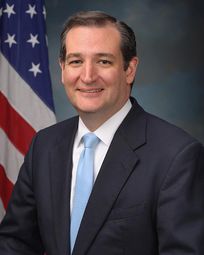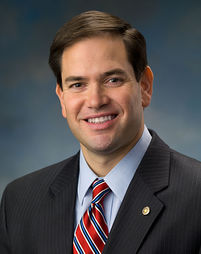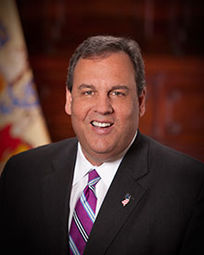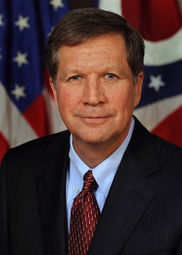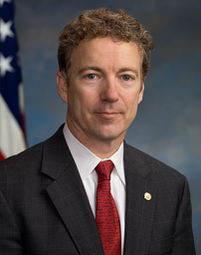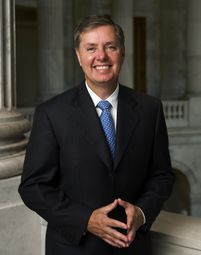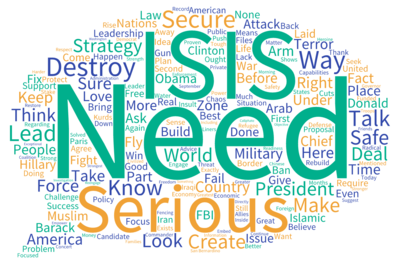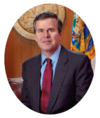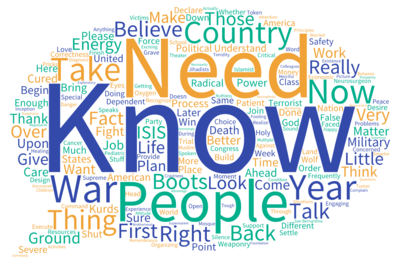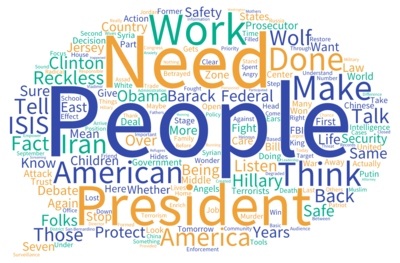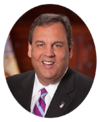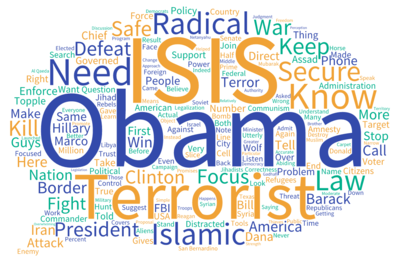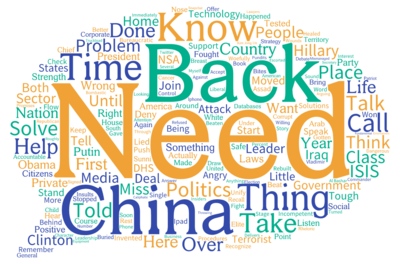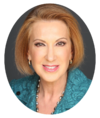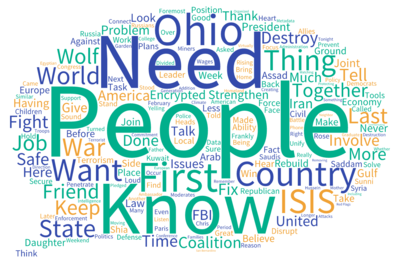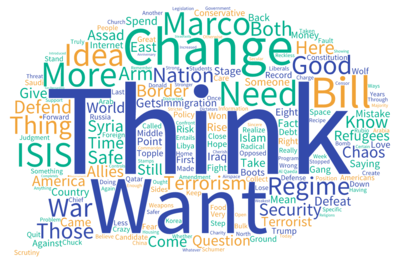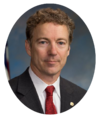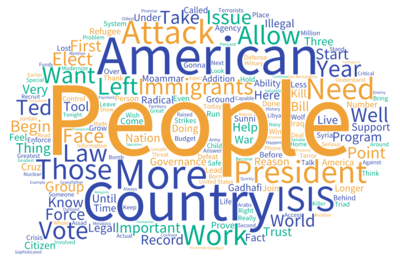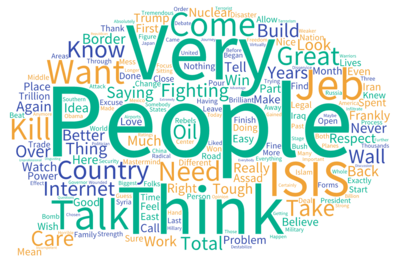Las Vegas, Nevada CNN/Salem Republican debate (December 15, 2015)
![]() Ballotpedia's scope changes periodically, and this article type is no longer actively created or maintained. If you would like to help our coverage grow, consider donating to Ballotpedia.
Ballotpedia's scope changes periodically, and this article type is no longer actively created or maintained. If you would like to help our coverage grow, consider donating to Ballotpedia.
This article focuses exclusively on the fifth Republican debate hosted by the CNN, Facebook, and Salem Media Group on December 15, 2015. Click here to access Ballotpedia's full 2015-2016 presidential debate coverage. A schedule for Republican primary debates can be found below.
Ballotpedia's coverage of the fifth Republican debate—which took place December 15, 2015—includes an overview of the event's basic information, the results of our Insiders Poll, statistics and post-debate commentary written by guest writers and members of our senior writing staff. The debate consisted of two back-to-back halves. Polling data was used to determine which candidates participated in each segment. More information on participants and rules for inclusion can be found in the "Basic Information" tab below.
Basic Information
Date: December 15, 2015
Time: 6:00 pm and 8:30 pm EDT
Location: Las Vegas, Nevada
Venue: The Venetian
Sponsors: CNN, Facebook and Salem Media Group
Moderators:
- Primetime debate: Wolf Blitzer, Dana Bash, and Hugh Hewitt
- Undercard debate: Wolf Blitzer, Dana Bash, and Hugh Hewitt
Rules for inclusion: Candidates were required to meet the following criteria in order to participate in the debate:[1] CNN announced the participants listed below on December 13, 2015.[2]
- To participate in the primetime debate, candidates were required to meet one of the following three criteria in polls, conducted between October 29 and December 13, recognized by CNN: Score average of at least 3.5% nationally; score at least 4% in Iowa; or at least 4% in New Hampshire. Polls that were considered included live interviewer national and state surveys by: ABC News, Bloomberg News, CBS News, CNN, Fox News, Gallup, Marist University, McClatchy News Service, Monmouth News Service, NBC News, The New York Times, Pew Research Center, Quinnipiac University, TIME, USA Today, The Wall Street Journal, The Washington Post, The Des Moines Register, the University of New Hampshire, WBUR and WMUR.
- Remaining candidates who scored at least 1% in four separate national, Iowa or New Hampshire polls conducted between October 29 and December 13, and recognized by CNN, were invited to participate in the earlier undercard debate. Polls that were considered included live interviewer national and state surveys by: ABC News, Bloomberg News, CBS News, CNN, Fox News, Gallup, Marist University, McClatchy News Service, Monmouth News Service, NBC News, The New York Times, Pew Research Center, Quinnipiac University, TIME, USA Today, The Wall Street Journal, The Washington Post, The Des Moines Register, the University of New Hampshire, WBUR and WMUR.
Participants
8:30 pm debate
6:00 pm debate
Statistics
This article analyzes the central themes of the Republican presidential debate held on December 15, 2015, in Las Vegas, Nevada. The transcript prepared by The Washington Post was used to measure candidate participation and audience engagement.[3] Footage from the debate was consulted where there were ambiguities in the text.
To compare the statistics of this debate to those of the previous Republican debate, see the analysis of the FOX Business Republican debate in November 2015.
Segments
The fifth Republican presidential debate featured 17 unique discussion segments covering national security and foreign policy. These discussion segments were measured by any shift in the theme of a discussion prompted by one of the moderators: Dana Bash, Wolf Blitzer and Hugh Hewitt. Facebook users also posed questions to the candidates in video clips.
- Introduction
- Banning Muslims from entering the U.S. and ISIS strategy
- Surveillance and national security
- Censorship of the Internet
- Civilian casualties and the authorization of military force
- Ground strategy in the Middle East
- Dictatorships and regime change in the Middle East
- U.S.-Russia relations
- Qualifications to be commander-in-chief
- Pathway to citizenship and immigration reform
- Syrian refugee crisis
- U.S.-North Korea relations
- Cybersecurity
- Nuclear warfare
- Presidential temperament
- Running as an independent candidate
- Closing statements
After the candidates' introductions, moderator Wolf Blitzer explained that the focus of the debate would be the candidates' "different approaches to keeping the country safe" in the wake of "terror attacks in Paris and San Bernardino."[3] A few discussion segments also covered immigration reform and candidates' individual qualifications to make military decisions.
Overall participation
Participation in a discussion segment was defined as a substantive comment related to the discussion segment's topic. Jokes and attempts to gain permission from a moderator to speak were not considered participatory speech acts. In some instances, candidates who participated in a discussion segment diverted from the prompted topic.
The median number of discussion segments was nine. Establishing the outer bounds of participation, Donald Trump and Rand Paul participated in eleven segments and seven segments, respectively.
Candidate participation by behavior
Participation in the debate was also measured by the candidate's behavior at the start of each discussion segment. This study considered whether a candidate was initially prompted to speak during a discussion segment by a moderator or whether he or she independently engaged in the discussion segment by interrupting another candidate or calling on the moderator for permission to speak. A candidate's conduct after they joined a discussion segment was not considered.
As in the third Republican debate, Carly Fiorina attempted to interject herself into the most discussion segments. Five candidates – Ben Carson, Chris Christie, Ted Cruz, Marco Rubio and Donald Trump – only engaged in discussion segments through moderator prompting.
Candidate participation by speaking time
According to speaking time estimates from CNN, Cruz spoke nearly three minutes longer than any other candidate, talking for approximately 16.1 minutes. Bush, Fiorina, Kasich and Paul each spoke for 10 minutes or less.[4]
Candidate participation by speaking rate
Each candidate's speaking rate was calculated by dividing the total word count of the candidate's speech during the debate with his or her speaking time as measured by CNN. Although Cruz spoke two minutes more than any other candidate, he tied for the slowest speaking rate with Carson. Rubio spoke the quickest at 234 words per minute.
Candidate participation by length of prepared remarks
Each candidate was given the opportunity to offer prepared remarks at the beginning and conclusion of the debate. With 415 words in his introductory and closing statements, Rubio used nearly double the number of words that Bush and Cruz did in each of their prepared remarks.
Candidate participation by segment vs. speaking time
The amount of time a candidate spoke did not necessarily align with the number of issues he or she covered during the debate. For example, Cruz spoke longer than any other candidate, but only participated in eight discussion segments.
Audience engagement
Audience engagement was measured by noting applause, cheering, or laughter in The Washington Post's transcript. Footage from the debate was consulted when the text was ambiguous about to whom the audience was responding.
With 19 separate instances of applause and laughter, Trump received the warmest response from the crowd. Most of this audience engagement came from commentary about the temperament of his competitors. Bush was Trump's main target, receiving criticism for his "energy," "attitude," and "tough" demeanor by Trump as the audience applauded.[3]
Candidate speech analysis
|
|
|
|
|
|
|
|
|
Ballotpedia's Insiders Poll
GOP Insiders: Rubio, Bush and Christie Shine on Vegas Strip
December 15, 2015 (Updated on December 16, 2015 at 12:07 pm EST)
By James A. Barnes
Florida Sen. Marco Rubio turned in another credible debate showing, but New Jersey Gov. Chris Christie also took advantage of his return to the main GOP debate stage and former Florida Gov. Jeb Brush turned in the kind of performance that many had been waiting for. In a survey of Republican political Insiders by Ballotpedia, 31 percent judged Rubio to be the “biggest winner” of the December 15 GOP presidential debate in Las Vegas conducted by CNN, while 21 percent awarded that title to Christie, and 21 percent gave the nod to Bush.
Ballotpedia surveyed more than 130 Republican and Democratic strategists, pollsters, media consultants, activists, lobbyists and allied interest groups operatives after the debate concluded: 90 Republicans responded and 43 Democrats participated. This survey was conducted anonymously to encourage candor from Insiders.
“Rubio was very good under fire tonight,” said one GOP Insider. “Strong, sure, comfortable in his own skin, not cocky,” added another. “An especially sharp contrast to Trump,” maintained a third GOP Insider. “Rubio showed he is ready to be Commander-in-Chief.”
But Rubio was hardly the runaway favorite in this debate that he was in Milwaukee on November 10, when 60% of the Republican Insiders said he was the “biggest winner.”
Christie won plaudits as well. “Voters want someone who is tough, tough on ISIS, tough on Hillary,” observed a GOP Insider. “Christie was tough without seeming shrill.” Another Republican noted that the focus on terrorism worked to Christie’s advantage: “Subject matter in his wheelhouse. Jeb and Rubio also strong.”
Bush, whose performances in previous debates have earned poor reviews, was seen as a contender at last. “Finally, a decent performance and an effective exchange or two with Trump,” said one GOP Insider. “Where was this Jeb Bush when we needed him and when he needed to be here?” Another Republican echoed that Bush, “finally showed up.”
While maintaining Bush had a good night, one GOP Insider wondered whether it was good enough: “Winner is a loose term. Jeb scored more points but when your [sic] down more than twenty points at halftime of the ball game you need to score and score heavily,” explained the GOP influential. “He didn’t.”
Singling out a debate victor is not an easy task, even for political insiders like these. “Hard to pick just one because there were a number of strong performances, but given the poor showing to date in debates, Bush team had to be encouraged tonight,” explained one Republican Insider.
Democratic Insiders gave the nod to billionaire developer and celebrity Donald Trump. Among that group, 33 percent thought Trump had won the evening, followed closely by 26 percent who believed Rubio had the best night and 16 percent who felt that Texas Sen. Ted Cruz performed best.
“No one landed a glove on the huge front runner,” said one Democratic Insider. “He’s Teflon Don!” exclaimed another. Indeed, when a front-runner in the polls gets through a debate without any major stumble, that candidate is frequently viewed as having won the encounter since there was no apparent blow to his (or her) momentum.
But Democrats also acknowledged Rubio’s Las Vegas performance. “He is not only articulate, but smart,” said one Democratic Insider. “You can see him becoming the consensus candidate to beat Trump.” Another noted, “He continues to impress with his understanding of the issues and ability to articulate a cogent point of view in response to any question.”
Carson, biggest loser
The “biggest loser” on the debate strip was retired pediatric neurosurgeon Ben Carson, although here too, the results were not clear-cut. While 30 percent of the Republicans thought Carson had the worst night, 18 percent saw Trump as the “biggest loser in the debate, followed by Rand Paul, 14 percent; John Kasich, 11 percent; and Cruz, 10 percent.
“For Dr. Carson, reciting facts about current events is not a demonstration of a grasp of the impact of those events,” said one GOP Insider. “Continued to demonstrate his lack of depth on foreign policy,” said another. “Wonderful man, but not a Commander-in-Chief,” added a third.
While Republicans responding in public opinion polls haven’t punished Trump so far for his broad-brush pronouncements on policy matters, Republican Insiders want to hear more in debates. “Showed very clearly he has no substance and now his style is wearing thin,” asserted one GOP Insider. “Yet again, a complete failure to offer any specifics,” echoed another.
Democrats had a slightly different take. Although 21 percent felt that Carson was the “biggest loser” at the Las Vegas debate, another 19 percent thought Bush turned in the worst performance. Of Carson, one Democratic Insider repeated the frequent GOP critique: “He confirmed that he is not ready to be Commander-in-Chief.”
But the Democratic criticism of Bush was withering at times. “As a Floridian, I can tell you he won reelection on the strength of his debate performances,” said one Democratic Insider. “That Jeb is hiding somewhere. This Jeb is rusty, halting and wholly unprepared.” Another said, “Bush doesn't even look like he belongs up there. He just looks lost.” And like some Republicans, one Democratic Insider thought that a stronger showing from Bush is what’s required to get back into serious contention for the GOP nomination: “He needed a big night; simply didn’t get it. He didn’t do poorly, it’s just that he needed to put points on the board and did not.”
But the views of Democrats are not what counts right now in the Republican presidential race and Bush did surprisingly well among GOP Insiders when they were asked: “On balance, do you think the following candidates helped themselves with this debate, hurt themselves, or neither?” Nearly three-quarters of the Republican Insiders, 73 percent, said that Bush had helped himself. And while that very narrowly trailed Christie’s mark of 76 percent, it was a higher “helped” rating—by far—than Bush has scored in any of the previous four GOP debates. Summing the candidates’ outings, one GOP Insiders observed: “Bush gave best performance, but has to ditch the specs; Trump was tinny; Christie called people out with gusto and Rubio acted like the Commander-in-Chief.”
And the GOP candidate that Democrats consider a threat in a general election face-off with Hillary Clinton? That continues to be Rubio, by a fairly commanding margin: fully half said the Florida Senator would give her the “toughest challenge” in general election debates. “He can come close to match her intellectually and is articulate in his message contrast with Dems,” said one Democratic Insider. “He presents a fresh face appears to be future oriented, even though he is a neocon by nature,” explained another. “Rubio is still potentially the toughest opponent, especially as Kasich and Bush have stumbled,” said a third Democrat. “Smooth on the stump and likable, the youthful contrast would play for some younger Democratic votes.”
James A. Barnes is a senior writer for Ballotpedia and co-author of the 2016 edition of the Almanac of American Politics. He has conducted elite opinion surveys for National Journal, CNN and the on-line polling firm, YouGov.
Debate Commentary
The columns below were authored by guest columnists and members of Ballotpedia's senior writing staff. The opinions and views belong to the authors.
The foreign policy choice
December 16, 2015
By Karlyn Bowman
Karlyn Bowman, a widely respected analyst of public opinion, is a senior fellow and research coordinator at the American Enterprise Institute, a conservative think tank in Washington, D.C.
What do Americans want U.S. foreign policy to be? There were some starkly different answers in last night’s Republican presidential debate in Las Vegas. Poll data over time show that Americans want an assertive president. They fear someone who is too weak or too strong. It was Gerald Ford who said Governor [Ronald] Reagan couldn’t start a war but a president Reagan could, trying to raise doubts about Reagan’s suitability for the nation's highest office.
We heard some echoes of that last night as Jeb Bush took on Donald Trump. Although Bush was stronger than in past debates, it isn't clear that his performance last night gave him a substantial boost.
Trump was in character. His first hour was much stronger than his second. No doubt RNC officials breathed a sigh of relief when Trump (and Ben Carson) said he wouldn't mount a third party bid, but we will have to see if he sticks to it.
Americans would be happy to see more democracies around the globe, they aren’t confident we know enough about how to achieve that goal. Ted Cruz responded to the doubts of many about democracy promotion. While Marco Rubio is always eloquent, Cruz articulated a case last night that is appealing to many grassroots Republicans. The Cruz-Rubio exchanges were sharp and interesting.
Americans recognize this is a very dangerous world and Chris Christie seems to articulate the fear America now has better than the other candidates. Polls show that Americans expect another terrorist attack on US soil. It is not a matter of “if” it will happen but “when.” His disdain for Washington’s responses was clear. It is a sentiment many Republicans and many Americans share.
While I am not sure there was a clear GOP winner, the debate was a win for CNN whose moderators handled the large field well.
On Cruz Control
December 16, 2015
By David Kusnet
David Kusnet is a former chief speechwriter for former President Bill Clinton. He is the senior writer and a principal at the Podesta Group, a government relations and public relations firm in Washington, D.C.
Last night, Ted Cruz showed the strategic sense that has made him the leading elected official in the Republican presidential field, according to recent polls.
Cruz avoided the confrontation with Donald Trump that many pundits had predicted and held his own in exchanges with Marco Rubio, while remaining focused on his own objective: consolidating anti-establishment voters behind his candidacy.
In the CNN debate, as in previous multi-candidate events and stump speeches, Cruz has displayed discipline in his framings and phrasings. As I’ve argued in these debate blog postings, preparing for public events doesn’t mean mouthing memorized sound bites, but rather anticipating how to respond to likely questions and counterpunches.
Cruz came prepared not with text but with a template that he followed with remarkable consistency. In responses that required contrasting himself with one or more opponents, Cruz followed this rhetorical roadmap:
First, in measured language, distinguish himself from his rival(s), implicitly or explicitly defining himself as the true believer and his opponent(s) as the trimmers.
Second, condemn President Obama and Democratic frontrunner Hillary Clinton more vehemently than he criticizes his Republican rivals. Sometimes, he attacks other Republican by associating them with these leading Democrats.
Third, conclude by presenting his position.
In his first exchange of the evening, Cruz followed this approach by disagreeing with Trump’s proposed ban on Muslim immigration, while reaching out to his rival’s supporters and offering his own alternative. “I understand why Donald made that proposal,” Cruz began. Then he distanced himself from the Donald: “I introduced legislation in the Senate that I believe is more narrowly focused at the actual threat, which is radical Islamic terrorism, and what my legislation would do is suspend all refugees for three years from countries where ISIS or Al Qaida control substantial territory.”
Later in the debate, Cruz returned to his template to attack the Democrats and, by extension, Republicans who have favored “regime change” in the Middle East, while pivoting to his own position: “Far too often, President Obama and Hillary Clinton—and, unfortunately, more than a few Republicans—have gotten distracted from the central focus of keeping this country safe,” Cruz maintained. He concluded, “And the approach, instead of being a Woodrow Wilson democracy promoter, we ought to hunt down our enemies and kill ISIS rather than creating opportunities for ISIS to take control of new countries.”
Similarly, during an exchange about immigration reform, Cruz used his approach of associating his Republican rivals with the Democrats by declaring: “Where there was a battle over amnesty and some chose, like Senator Rubio, to stand with Barack Obama and Chuck Schumer and support a massive amnesty plan.”
With his strategically structured responses, Cruz is not as entertaining as Trump, as eloquent as Rubio, or as much the everyman as Chris Christie. But he accomplishes what he sets out to do: define himself and dismiss his opponents in ways that appeal to his audience.
Republican Debate Schedule
Click the schedule to return back to the top of the page.
See also
- Presidential debates (2015-2016)
- Presidential candidates, 2016
- Presidential election, 2016/Polls
- 2016 presidential candidate ratings and scorecards
- Presidential election, 2016/Straw polls
Footnotes
- ↑ 'CNN, "CNN Republican presidential debate criteria announced," November 20, 2015
- ↑ CNN Politics, "Stage set for final GOP debate of 2015," December 13, 2015
- ↑ 3.0 3.1 3.2 The Washington Post, "5th Republican debate transcript, annotated: Who said what and what it meant," December 15, 2015
- ↑ CNN, "Interactive: Republican debate by the numbers," December 16, 2015



